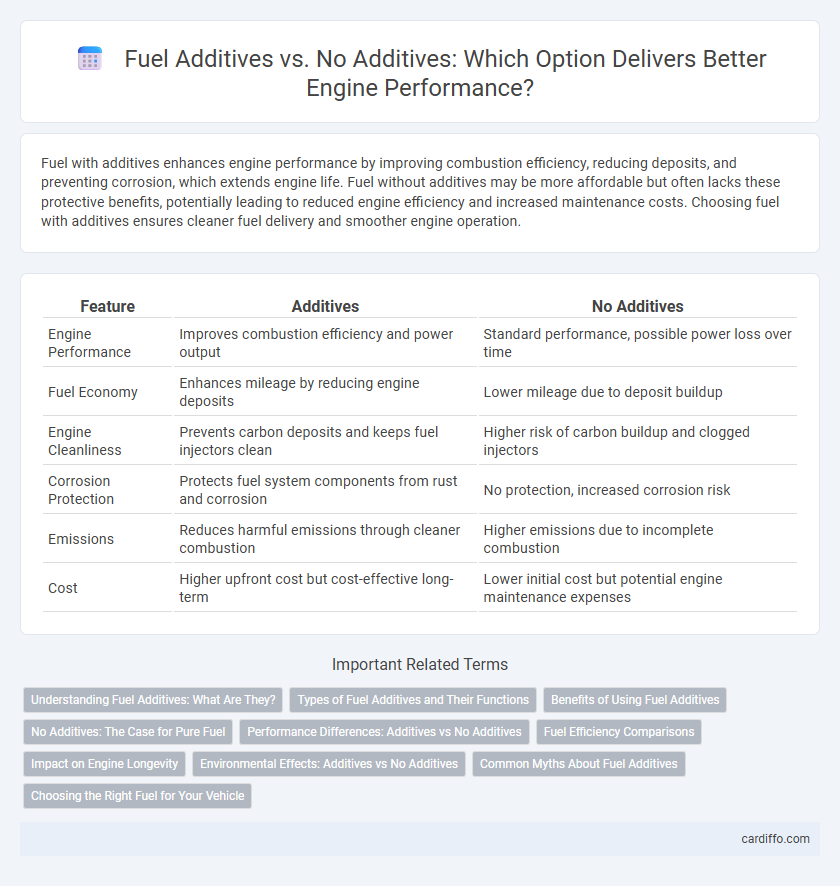Fuel with additives enhances engine performance by improving combustion efficiency, reducing deposits, and preventing corrosion, which extends engine life. Fuel without additives may be more affordable but often lacks these protective benefits, potentially leading to reduced engine efficiency and increased maintenance costs. Choosing fuel with additives ensures cleaner fuel delivery and smoother engine operation.
Table of Comparison
| Feature | Additives | No Additives |
|---|---|---|
| Engine Performance | Improves combustion efficiency and power output | Standard performance, possible power loss over time |
| Fuel Economy | Enhances mileage by reducing engine deposits | Lower mileage due to deposit buildup |
| Engine Cleanliness | Prevents carbon deposits and keeps fuel injectors clean | Higher risk of carbon buildup and clogged injectors |
| Corrosion Protection | Protects fuel system components from rust and corrosion | No protection, increased corrosion risk |
| Emissions | Reduces harmful emissions through cleaner combustion | Higher emissions due to incomplete combustion |
| Cost | Higher upfront cost but cost-effective long-term | Lower initial cost but potential engine maintenance expenses |
Understanding Fuel Additives: What Are They?
Fuel additives are chemical compounds blended into gasoline or diesel to enhance engine performance, fuel efficiency, and emission control. These additives include detergents to clean fuel injectors, antioxidants to prevent oxidation, and corrosion inhibitors to protect fuel system components. Using fuel with additives improves combustion quality and engine longevity compared to fuels without additives.
Types of Fuel Additives and Their Functions
Fuel additives improve engine performance and longevity by targeting specific issues such as combustion efficiency, deposit control, and corrosion prevention. Common types include detergents that clean fuel injectors, antioxidants that prevent fuel oxidation, and cetane improvers that enhance diesel ignition quality. Understanding additive functions helps optimize fuel stability, reduce emissions, and maintain engine cleanliness for better overall efficiency.
Benefits of Using Fuel Additives
Fuel additives improve engine performance by enhancing combustion efficiency and reducing carbon deposits, leading to cleaner engine components. They help lower emissions and increase fuel economy by optimizing fuel stability and preventing oxidation. Consistent use of fuel additives extends engine life and decreases maintenance costs by protecting against corrosion and wear.
No Additives: The Case for Pure Fuel
Pure fuel without additives preserves engine performance by maintaining the original chemical composition, reducing potential deposits and corrosion from unnecessary chemicals. Studies show that additive-free fuels minimize the risk of fuel system clogs and improve long-term engine reliability, especially in older vehicles or machinery designed for simpler fuel formulations. Opting for additive-free fuel supports cleaner combustion, resulting in lower emissions and healthier engine operation.
Performance Differences: Additives vs No Additives
Fuel additives enhance engine performance by improving combustion efficiency, reducing deposits, and preventing corrosion, resulting in smoother engine operation and increased power output. In contrast, fuel without additives may lead to incomplete fuel burn, accumulation of engine deposits, and reduced fuel economy, causing decreased overall performance. Studies show engines running on additives-boosted fuel experience better acceleration, lower emissions, and improved fuel stability compared to those using non-additive fuel.
Fuel Efficiency Comparisons
Fuel with additives enhances combustion efficiency by improving injector cleanliness and reducing engine deposits, resulting in better mileage compared to fuel without additives. Additives help maintain optimal fuel atomization and prevent oxidation, which preserves fuel quality and maximizes energy output. Vehicles using additive-enhanced fuel often experience up to 5-10% improved fuel efficiency versus standard fuels lacking these performance-enhancing compounds.
Impact on Engine Longevity
Fuel additives enhance engine longevity by reducing deposits, preventing corrosion, and improving fuel combustion efficiency. Engines running on fuel without additives often experience increased wear and carbon buildup, leading to decreased performance and potential engine damage over time. Consistent use of additive-containing fuels supports cleaner engine components and extends overall engine lifespan.
Environmental Effects: Additives vs No Additives
Fuel additives can reduce harmful emissions by improving combustion efficiency and lowering pollutants such as carbon monoxide, nitrogen oxides, and particulate matter. Fuels without additives often lead to higher engine deposits and incomplete combustion, which increase environmental pollutants and contribute to air quality degradation. The use of eco-friendly additives supports regulatory compliance and minimizes the ecological footprint of fuel consumption.
Common Myths About Fuel Additives
Fuel additives are often misunderstood, with common myths claiming they always enhance engine performance or prevent all types of deposits, when in fact their effectiveness depends on the specific additive and engine condition. Many believe additives can compensate for poor fuel quality, but high-grade fuels typically contain necessary detergents already. Using additives without need may lead to unnecessary expenses and, in some cases, engine issues if incompatible products are applied.
Choosing the Right Fuel for Your Vehicle
Selecting the right fuel for your vehicle significantly impacts engine performance and longevity. Fuels with additives contain detergents and stabilizers that reduce engine deposits and improve combustion efficiency, while plain fuels without additives may lead to increased carbon buildup and reduced efficiency over time. Evaluating factors such as manufacturer recommendations, driving conditions, and fuel quality ensures optimal engine health and fuel economy.
Additives vs No Additives Infographic

 cardiffo.com
cardiffo.com